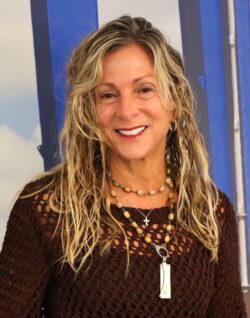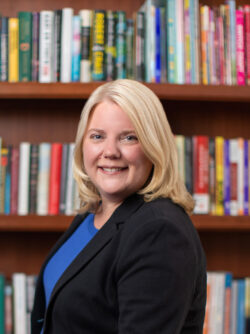According to research by Gartner and AWESOME, women hold about 21 percent of top management positions in supply chain. Two of those have ties to the University of Tennessee, Knoxville’s Haslam College of Business. Annette Danek-Akey, Penguin Random House’s chief supply chain officer, is a student in Haslam’s Executive MBA for Global Supply Chain (EMBA-GSC) program, and Barbara Melvin (EMBA-GSC, ’18), president and CEO of South Carolina Ports, is an alumna.
Both are accomplished business leaders. Melvin is the first woman to lead a top 10 U.S. operating container port. Danek-Akey was Penguin Random House’s first woman executive vice president, supply chain, and has recently been promoted to the newly created position of chief supply chain officer, continuing as EVP. Both are on boards, committees and other groups serving their professions and their communities, and both already have accumulated awards and honors for a lifetime. Most recently, Melvin was recognized as the 2021 South Carolina Manufacturers Alliance Woman of the Year by South Carolina’s manufacturing sector, while Danek-Akey was ranked No. 75 on Supply Chain Digital’s 2022 “Top 100 Women in Supply Chain” list. They recently sat for a short question and answer session on their respective operations, Covid-19’s impact and more.
What is one of your biggest achievements?
 Melvin: One project we are working on is deepening Charleston’s channel and harbor, which is designed to accommodate the industry’s demand for larger ships. For it, we had to modernize a process the U.S. Corps of Engineers used for decades in ports around the nation. This puts Charleston on track this year to have the deepest harbor on the East Coast, at 52 feet.
Melvin: One project we are working on is deepening Charleston’s channel and harbor, which is designed to accommodate the industry’s demand for larger ships. For it, we had to modernize a process the U.S. Corps of Engineers used for decades in ports around the nation. This puts Charleston on track this year to have the deepest harbor on the East Coast, at 52 feet.
That was my biggest challenge, and not only was it a success, it also was the shortest project from start to finish in the history of any deepening project of this magnitude. Typically, you would have a lot of litigation related to the environmental impacts of a project of that nature. We avoided that by continuing to work with the conservation community throughout it and benefiting their conservation goals.
 Danek-Akey: Over the last 15 years, we have worked on a project to provide reliable and rapid replenishment to our customers. We took an end-to-end, holistic view of our product replenishment process and worked to shorten delivery times. We segmented our process and came up with solutions, sales channel by sales channel, customer by customer, and segmented by product type and product velocity.
Danek-Akey: Over the last 15 years, we have worked on a project to provide reliable and rapid replenishment to our customers. We took an end-to-end, holistic view of our product replenishment process and worked to shorten delivery times. We segmented our process and came up with solutions, sales channel by sales channel, customer by customer, and segmented by product type and product velocity.
Obtaining buy-in from the entire organization was very collaborative, and the resulting program drastically reduced customer replenishment time and cut product returns to the firm by 50 percent.
The best part of this program is that this quick turnaround of replenishment to our bookstores allows them to stay in stock with less inventory carrying costs. It was a win-win-win for our customers, our authors and for us. I’m extremely proud of it.
How did the Covid-1 pandemic affect your operations?
Danek-Akey: We were dealing with significantly more “exception processing” – fulfilling one-off orders – but, recognizing that exceptions are more common, we developed operating procedures for them.
Melvin: SC Ports was able to learn lessons from ports on the West Coast that saw transport vessels queuing up outside harbors for weeks at time. We reduced the lines at Charleston in about half the time it took those other ports.
Has the pandemic affected supply chain in other ways?
Melvin: It’s going to highlight the importance of supply chain and its total value. The success of your supply chain is going to be much more of an elevated conversation in the C-suite.
Danek-Akey: We’re extremely visible right now, which is good, because we’re getting a seat at the table. I see a lot of supply chain projects that might have been in the middle or the bottom of the list that are now moving to the top of the list.
You both say newcomers to the industry can overcome barriers to climbing the corporate ladder by striving to exceed expectations, being team players and making clear their aspirations. Do you have additional advice to those who want to succeed in supply chain?
Melvin: Make sure they have a holistic picture of the impact of supply chain and have a great grasp of the numbers. Take the time to have a double major or at least a minor in finance. Because whoever owns the numbers, owns the C-suite.
Danek-Akey: I would say to always say, “Yes.” Yes, to opportunities that are going to stretch your learning and then continue to invest in lifelong learning. This includes networking, reading industry-related materials, joining professional organizations and maintaining contact with schools and professors. In my new role as chief supply chain officer, I said yes to temporarily relocating to the UK, which is going to expand my global leadership development.
What are your take-aways from your experience in Haslam’s EMBA-GSI program?
Danek-Akey: The material is at the right level that I can synthesize what I’ve learned in 28 years and add to it what’s new in the discipline. It’s uncanny the way it’s matched up to the things that I’m working on day to day. It was the program that I didn’t know I needed.
Melvin: Beyond teaching me the importance of finance and that the C-suite must work as a team, what UT offers to me through its Global Supply Chain Institute is networking. I cannot think of an organization that puts you in front of so many shippers, whether importers or exporters, in one room, all talking about issues that start or end with a port.
Additionally, Melvin says her organizational action project – OAPs are assignments all students complete that address a significant challenge or opportunity their organizations face – is another benefit from the program.
Melvin: My organizational action project analyzed rail cargo transportation alternatives and planned the transition to them. It is being funded by our legislature to the tune of $550 million and will have a lasting impact on our rail business, which is about 25 percent of our total volume. So, I would say, if anybody wants to know the value of that program, there’s the value to us.
—
CONTACT:
Scott McNutt, business writer/publicist, rmcnutt4@utk.edu

